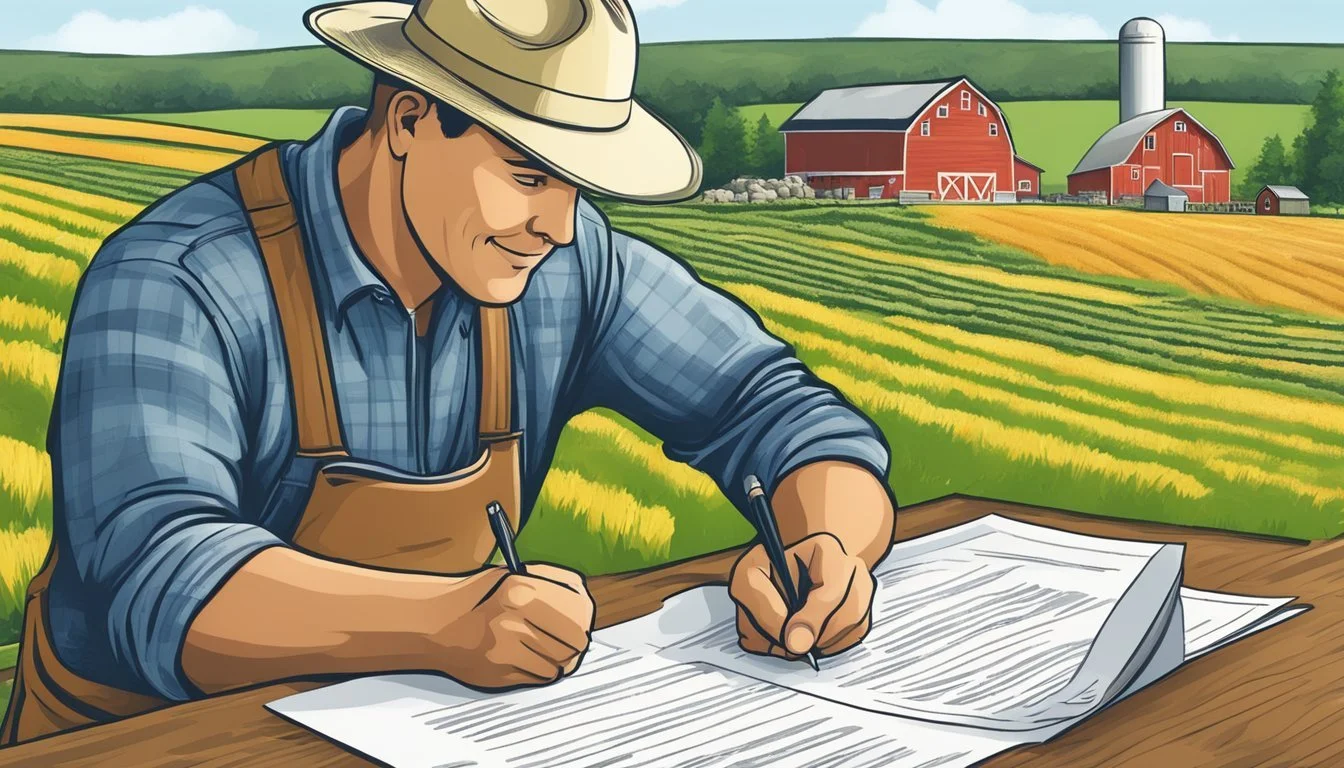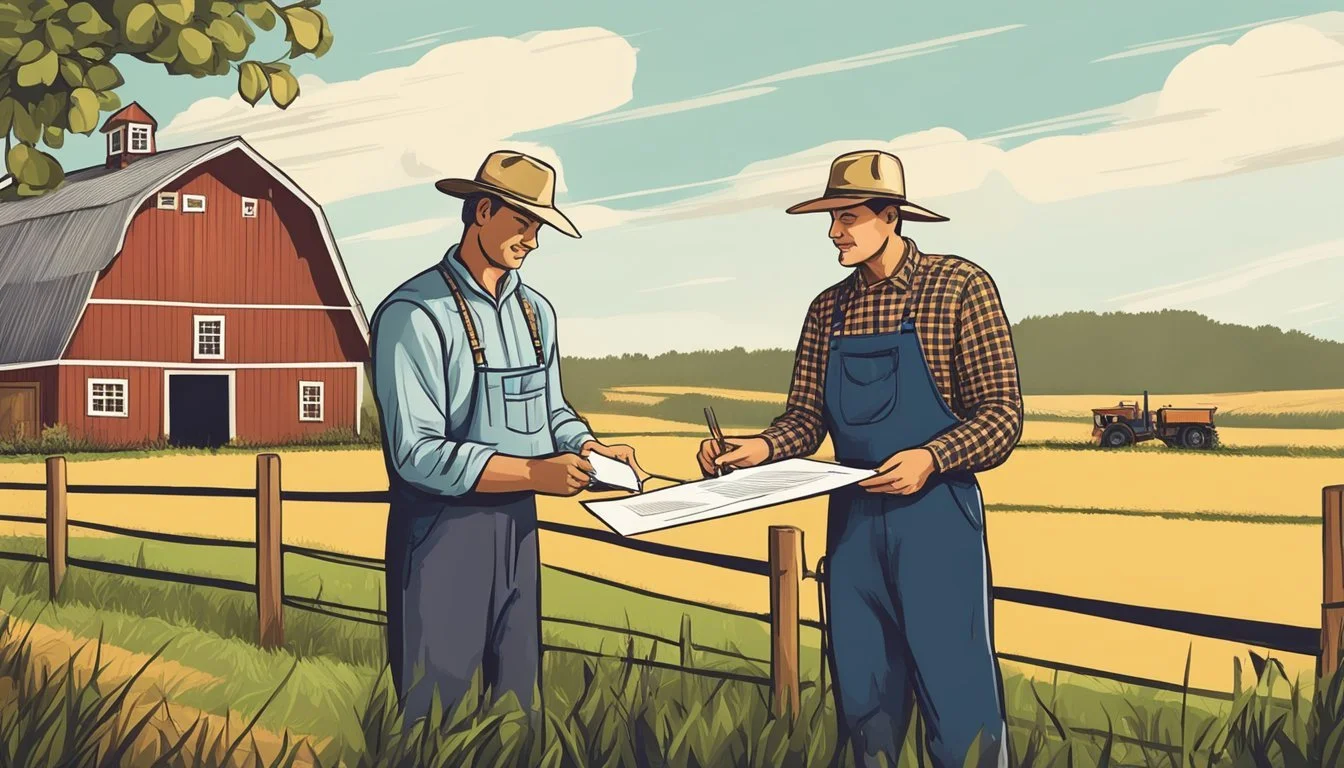Massachusetts Farm Land for Lease
Opportunities and Options
This Article is Part of Our Guide on Navigating Agricultural Leases Across the US
Massachusetts boasts a diverse agricultural landscape that offers various land leasing opportunities for those looking to engage in farming activities. The state has a rich history of farming, which continues to evolve with shifts in sustainable practices and local food movements. Access to farmland is facilitated through both private leases and state-administered programs, catering to a spectrum of farming operations from small-scale organic to larger agribusinesses. The demand for agricultural land in Massachusetts reflects a growing interest in locally sourced produce and the general expansion of niche farming enterprises.
Leasing farmland in Massachusetts provides a vital entry point for new and expanding farmers who may not have the capital to purchase property outright. It also offers flexibility, allowing landowners and farmers to negotiate terms that suit the needs of both parties. Farmlands for lease come in various sizes and infrastructures, including parcels with essential facilities like barns and greenhouses as well as bare land. These leasing arrangements contribute to the state's agricultural economy and open pathways for innovation and community involvement in local food systems.
Engagement with local agricultural entities and resources such as New England Farmland Finder can support prospective lessees and lessors in making informed decisions. State-owned farmland licensing programs typically offer leases for five years, granting stability for farmers to develop their practices while managing the land responsibly. The agricultural landscape in Massachusetts hence provides a framework not just for fruitful farming, but also for securing a sustainable future for the state’s food production and rural communities.
Understanding Farm Land Leasing in Massachusetts
Leasing farmland in Massachusetts involves understanding state-specific regulations, interacting with the Massachusetts Department of Agricultural Resources, and complying with land use and zoning laws.
State-Specific Regulations
Massachusetts offers a variety of regulations that govern farm land leases. Landowners and farmers must ensure leases are structured within these legal frameworks. For instance, the duration of a lease can range from short-term arrangements to long-term commitments. Specifically, Massachusetts General Laws address aspects such as lease terms, rights, and renewal options that protect both parties involved in the agricultural lease.
Massachusetts Department of Agricultural Resources (MDAR)
MDAR plays a crucial role in supporting the leasing of farm land. They provide resources, guidelines, and programs that foster farmland preservation and sustainability. One such initiative is the Agricultural Preservation Restriction (APR) program, which aims to protect and preserve farm lands. MDAR also oversees lease agreements involving state-owned farmlands, ensuring they align with agricultural use and public interest.
Land Use and Zoning Laws
Land use and zoning laws in Massachusetts are integral to farm land leasing, as they dictate permissible agricultural activities on various parcels. Municipalities have established zoning bylaws that determine where farming can occur and under what conditions, such as:
Types of permitted agricultural activities
Farm building and storage regulations
Environmental and conservation considerations
Potential lessees must review local zoning bylaws to confirm that their intended use of the land is allowable.
Finding Available Farm Land
When searching for available farmland to lease in Massachusetts, farmers have several reliable resources and tools at their disposal. These range from online platforms advertising available commercial land to interactive mapping systems and the creation of farm seeker profiles that help match potential lessees with suitable land.
Commercial Farm Land for Lease
Farmers in Massachusetts can explore various properties for lease, tailored to meet their specific agricultural needs. While specific lease rates and acreage can vary widely, resources like LandSearch provide listings with detailed lease arrangements. For instance, one could find information on land spanning from 12 acres in Suffolk County to a 14-acre plot with an annual lease of $19,000. These commercial listings are critical for farmers who require precise details about potential farming sites.
Mapping Resources for Farmland Search
Interactive mapping tools are invaluable for farmers looking to lease agricultural land in Massachusetts. These resources help visualize the geographic location of available farms, delineating their proximity to markets, water sources, and other essential infrastructure. The New England Farmland Finder, for example, offers a user-friendly way to identify and investigate potential land parcels across the state, giving farmers a comprehensive overview of their options.
Farm Seeker Profile Creation
Creating a farm seeker profile is another strategic step in locating farmland for lease. Platforms like New England Farmland Finder allow potential lessees to advertise their farming experience, vision, and goals, alongside their specific farmland and infrastructure needs. By detailing their farming background and objectives, farmers can capture the attention of landowners looking to lease their property to individuals with clear farming aspirations and capabilities.
Lease Agreements and Considerations
When entering a lease agreement in Massachusetts, landowners and farmers must address critical details to ensure the success of the partnership. This section will explore the necessary components of a farm lease, the evaluation of infrastructure and improvement needs, and how to align the agreement with the long-term vision and goals of both parties.
Components of a Farm Lease
A comprehensive farm lease should encompass several key elements to prevent future disputes and clarify expectations. The lease should clearly state the following:
Duration: The lease term, including start and end dates.
Rent: Payment terms, including amount, frequency, and method.
Property Use: Specified agricultural activities permitted on the land.
Maintenance: Responsibilities of each party for upkeep and repairs.
Infrastructure and Improvement Needs
Leasing for agricultural purposes often involves evaluating the existing infrastructure. Prospective tenants must consider:
Buildings & Facilities: The condition and availability of barns, sheds, and storage.
Water Systems: Adequate access for irrigation and livestock.
Fencing & Roads: The state of fences and the accessibility of farm roads.
Long-Term Vision and Goals
Finally, a successful lease aligns with the long-term vision and goals of both landowner and lessee. This requires:
Growth Projections: How the land can accommodate future expansion.
Sustainability Practices: Incorporating environmentally friendly farming methods.
Renewal Terms: Conditions under which the lease may be extended or terminated to support long-range planning.
Financial Aspects of Farm Leasing
When leasing farm land in Massachusetts, it is crucial for both landowners and farmers to understand the financial implications. This includes determining the lease rates that reflect the value of the land and negotiation strategies to reach a fair agreement.
Determining Lease Rates
Determine the value of the agricultural land based on its location, soil quality, and access to resources like water.
Assess comparable leases in the region to set a competitive rate.
Consider the type of lease: cash rent, crop share, or a flexible lease arrangement.
Adjust rates accordingly for the size of the operation and the projected revenue of the crop or livestock yield.
Example Table: Average Lease Rates in Massachusetts
Land Quality Average Cash Rent per Acre High Quality $X - $Y Medium Quality $X - $Y Low Quality $X - $Y
Strategies for Negotiation
Landowners and lessees should approach negotiations with transparency about their expectations and limitations.
Both parties must be knowledgeable of current market trends and regulatory factors influencing agricultural land use in Massachusetts.
Establishing a flexible lease can be beneficial, where payments are related to farm income, thus sharing the risk between the landowner and the lessee.
Written agreements help to formalize the negotiations and ensure a clear understanding of terms, preventing future disputes.
Resources for Aspiring Farmers
In Massachusetts, individuals looking to enter the farming industry have access to valuable programs that offer education, land matching, and support to navigate the complexities of starting a farm.
Tufts University New Entry Program
The New Entry Sustainable Farming Project at Tufts University is a pioneering initiative aimed at assisting those new to the agricultural sector. They provide comprehensive training in agricultural practices, business planning, and marketing to equip new farmers with the necessary skills for success. Their offerings include:
Training: Hands-on and classroom-based educational programs.
Resources: Access to farm equipment and personalized technical assistance.
Support Network: A community of fellow farmers and mentors for guidance.
Farm Lease Connection Programs
Farm lease connection programs are essential for new farmers seeking land, especially in regions where ownership can be cost-prohibitive. These programs include:
Matching Services: Assistance in finding appropriate farmland to lease.
Lease Education: Information on leasing arrangements to ensure both parties’ needs are met.
Legal Resources: Templates and advice for lease agreements to protect the interests of the landowner and the farmer.
Online Platforms and Tools
Online platforms dedicated to agricultural real estate provide invaluable tools for those seeking farm land for lease in Massachusetts. They offer robust search capabilities, detailed filters, and a platform for owners to list their properties.
Filters and Icons for Property Search
When using online platforms to search for farm land for lease, prospective lessees can leverage multiple filters to narrow down their search according to their specific needs. For example, filters may include:
Size: Acreage of the property
Location: Specific county or region within Massachusetts
Price range: Minimum and maximum lease cost per month
In addition, users can quickly identify the features of a property through visual icons. These icons might represent farm amenities such as water access, organic certification, or included structures like barns and greenhouses.
Owners' Listing and Posting Requests
Property owners looking to lease their farm land can utilize these platforms to post their listings. These listings typically include detailed descriptions of the farm, available resources, and leasing terms. Owners can request to post their property by providing required information, such as:
Property size and location
Lease pricing
Contact details for lease inquiries
Through these platforms, they can reach a wide audience of potential lessees, facilitating a more efficient leasing process.
Legal and Contractual Obligations
Landowners and tenants entering a lease in Massachusetts must navigate various legal and contractual obligations. It's important they understand these terms to ensure a successful leasing partnership.
Understanding Lease Contracts
A lease contract is a legally binding agreement between the landowner and the tenant. In Massachusetts, this document outlines the rights and responsibilities of each party concerning the use of farmland. Key components include:
Duration: specifying the lease term, whether it's annual or for a longer period.
Renewal Terms: addressing renewal options and conditions.
Use of Property: defining permissible agricultural activities and any restrictions.
Rent: detailing payment schedules, amounts, and methods.
Maintenance: assigning responsibility for the upkeep of the property.
Landowners should make sure that the lease agreement complies with all state-specific regulations and that it is thorough enough to cover all the specifics to avoid future disputes. Tenants should ensure they fully understand their obligations under the lease before signing the agreement.
Resolving Disputes and Conflicts
Even with a comprehensive lease agreement, disputes can arise. In Massachusetts, contractual provisions in a commercial lease may include:
Waivers: limiting certain damages, such as speculative or consequential damages arising from a landlord's failure to fulfill obligations.
Conflict Resolution Methods: which may include mediation, arbitration, or litigation procedures.
Both parties are typically encouraged to resolve conflicts through direct communication and negotiation. If an agreement can't be reached, the outlined resolution procedures in the lease will guide the next steps. Adhering to these methods helps avoid prolonged disputes and maintains the leasing relationship.
Success Stories and Case Studies
In Massachusetts, leasing farmland has paved the way for numerous success stories, demonstrating viable paths for new and existing farmers to thrive. These narratives and lessons come from farmers who have navigated the complexities of leases and built prosperous agricultural operations.
Successful Farming Experience Narratives
Tierra Fértil stands as a testament to the success that can be achieved through long-term leases. The farmers, Chang and Ger Xiong, together with Christina Dedora and Ben Torpey, have cultivated 50 acres, showcasing the potential of sustainable lease agreements in supporting sizable farm operations.
Farm Operation: Vegetable, Specialty Crop
Access Method: Long-term lease, public land
Through collaborative efforts, land trusts in Massachusetts have also played a significant role in facilitating successful farm transfers. For instance, Ground Lease Farms showcases models similar to those used in affordable housing, where farmland is secured at affordable rates, ensuring the land remains dedicated to agriculture over the long term.
Lessons Learned from Past Leases
Farmers and land trusts have distillate valuable insights from their leasing experiences:
Importance of Clear Agreements: A definitive and detailed lease agreement is crucial to prevent misunderstandings and lay a foundation for a fruitful relationship between landowner and farmer.
Flexibility and Adaptability: Farms operating under leases, such as those managed by community land trusts, highlight the need for flexibility in lease terms to accommodate the changing dynamics of agriculture.
By examining these real-world examples, aspiring farmers in Massachusetts can garner the necessary foresight to approach land leasing with a strategic mindset, setting themselves on a path toward agricultural success.
Future Trends in Farm Land Leasing
As the agricultural industry evolves, farm land leasing trends in Massachusetts are expected to be influenced by a range of factors. Visionary approaches to agriculture and sustainability are shaping the future of land leases.
Trends suggest an increase in flexible lease agreements, such as flex rent farm leases. This type of lease considers variables like commodity prices and input costs, thereby allowing both landowners and farmers some degree of financial cushioning against market volatility.
Another anticipated trend is the greater inclusion of conservation practices in lease terms. Landowners and farmers increasingly prioritize soil health and environmental stewardship, leading to leases that incorporate sustainable farming practices.
The convergence of technology and farming may introduce more data-driven lease agreements. Precision agriculture has the potential to make land more productive and, by extension, affect lease rates and terms.
Collaboration between landowners and farmers, aimed at fostering long-term relationships, is likely to increase. This collaborative approach may address land succession concerns and ensure the continued viability of farms.
Short-term leases may see a decline in favor of long-term arrangements that offer stability and enable substantial investment in the land.
Leasing farm land in Massachusetts is expected to adapt to these trends, reflecting both the practical needs of modern agriculture and the ethical considerations of land stewardship.











